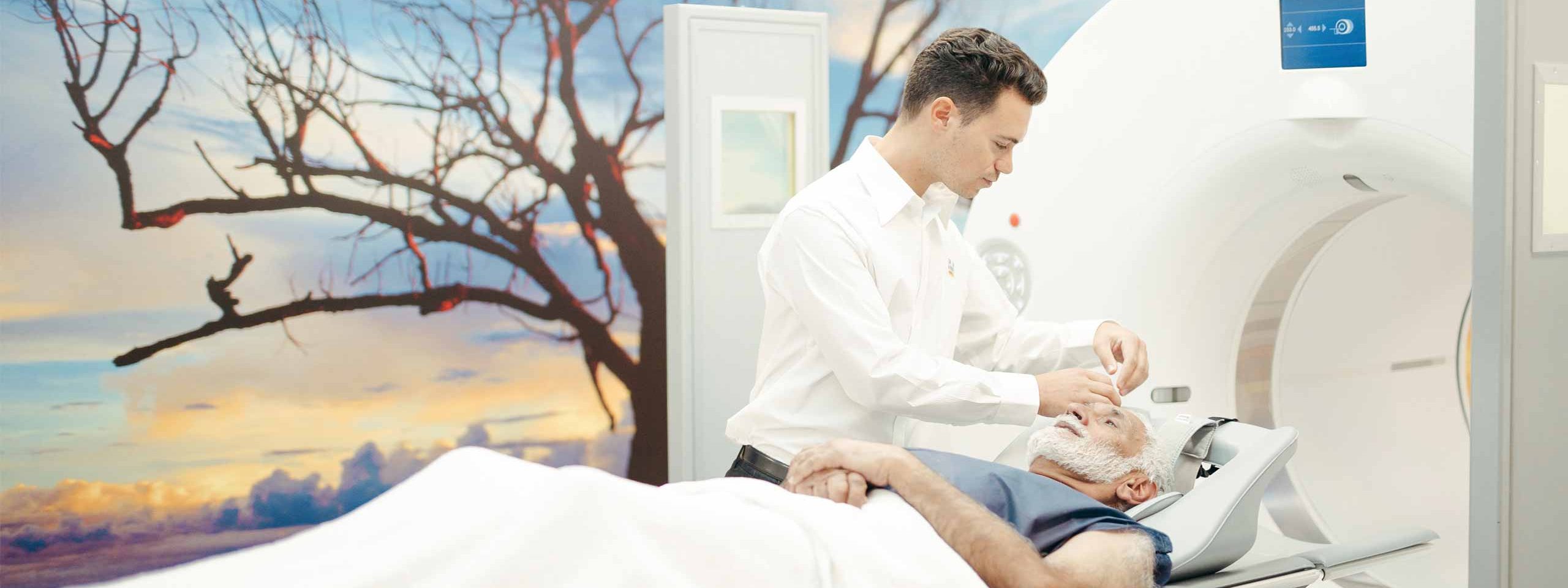PET (or Positron Emission Tomography) is a branch of Nuclear Medicine imaging that uses special radioactive materials (positrons), in conjunction with a low-dose CT scan, to produce three-dimensional images of the body.
PET is a specialised imaging technique that has various roles including aiding in the detection of cancer; staging cancers before to surgery; monitoring the response to chemotherapy, and detecting the recurrence (return) of tumours. It is commonly used for tumours like lymphoma, melanoma, bowel and oesophageal cancer, and head and neck tumours. It can also be useful in a variety of other tumours, as well as heart and brain imaging.
The radioactive tracer used for PET scans is delivered to our clinics daily. The radioactive tracer has a short active life, meaning it only works for a short amount of time. For reasons beyond our control, such as delays in transport and variables in the manufacture, we are unable to confirm scan times until the day before the appointment. Therefore, you must be contactable any time the day before, and the day of, the appointment. If you are late or miss your appointment time, we may have to reschedule your scan to a different day.
Before your Scan
You will be required to fast for 4 – 6 hours before the examination (water only may be consumed).
At the time of booking, you will be given specific instructions regarding hydrating, medications and other relevant preparation required for your examination. Please advise our staff if you are diabetic when making your booking.
You will be contacted the day prior to your examination confirming appointment time and preparation.
If you experience claustrophobia (fear of small places), you may have feelings of discomfort about the PET scanner. Please discuss this with us before your scan. If sedation (medication to relax you) is required, you will need to arrange for someone to drive you home.
Procedure
When you arrive, the staff will ask some relevant medical history questions. A needle will be placed into a vein in your arm, and your blood sugar level will be checked. You will lie or sit in a private room where you will be injected with the tracer into your bloodstream (through the needle in your arm).
You will then be asked to rest quietly for approximately an hour during this process. During this time, you may listen to music or watch TV unless undergoing a brain examination where minimal sound and visual stimulation is required.
After waiting 1 hour for the tracer to adequately circulate the body, a 30-minute scan will be done. Allow a total for 2.5 hours to complete the examination.
Duration
This will depend on the type of scan being done, but you can expect to be in the PET imaging department for between two to three hours. The time on the PET scanner is typically 30 minutes, but time is also needed for preparation. When the scan is completed, you will be asked to wait while the images are checked to make sure they are clear. Occasionally, there is a need to obtain more images following this check.
Risks / Side effects
Side effects of the tracer such as nausea, vomiting or a rash are very uncommon, occurring in approximately 1 in 10,000 people.
After the procedure, you can drive a car and eat and drink normally. The tracer will have cleared the body by itself within 24 hours. The radiation dose is equivalent to having a diagnostic CT scan, and it is safe to be around other people, including children, immediately after the scan.
It is important to tell staff if there is any chance you may be pregnant, or breastfeeding, before booking your appointment. Precautions will need to be taken for breastfeeding women, and these will be discussed with you before booking.
View the Patient Care page for additional information regarding patient safety.
Are you ready to make your PET Scan (Positron Emission Tomography) appointment?
Our online booking platform allows you to quickly and easily make an appointment online.



